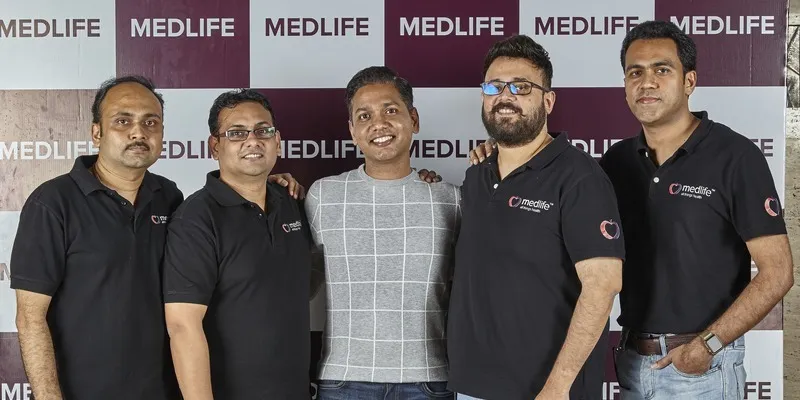Having run around for parents' medicine, this entrepreneur now makes healthcare a seamless experience
Online healthcare platform Medlife delivers medicines, online doctor consultations, wellness products, and laboratory services.
Startup: Medlife
Founders: Tushar Kumar and Prashant Singh
Year it was founded: November 2014
Where is it based: Bengaluru
The problem it solves: Healthcare delivery
Sector: Healthcare
Funding raised: $30 million
One of the biggest concerns for people seeking healthcare is finding the right provider. From specialist doctors and diagnostic centres, to easy availability of medicines, zeroing in the right fit has often stumped many. It this very anxiety for his elderly parents that led 38-year-old Tushar Kumar to find a solution, and in turn, start Medlife.
Tushar often found himself going to several medical stores to find medicines that his parents had been prescribed. “Once I had to go to a store that was 40 km away from my store to get the required medicines. It then became clear that there was a huge gap in the market,” he says.
A stint abroad really showed him the disconnect in the Indian market. Overseas, his visits to the doctor were well-managed – appointments were made online, and there was even an online queue tracking system that let Tushar know when the doctor would see him.
Electronic prescriptions made paper redundant, and Tushar says he was also told which pharmacy would have stock of the medicines he required. “The pharmacy had all my medicines ready and packed. All I needed to do was pick them up,” says Tushar.

The difference
This disparity had Tushar realise the healthcare ecosystem in India needed to be fixed and this could only be done using technology. In November 2014, Tushar, along with his friend Prashant Singh, set up Medlife.
Medlife is a healthcare platform that aims to solve inadequacies of the healthcare delivery system through technology. Tushar says the idea was to provide a platform that would enable a consumer to gain access to healthcare services at all levels, starting from having clinic visits and prescriptions recorded and stored, to ordering medicines online and having them delivered, to e-consultations with doctors, and scheduling diagnostic tests.
Growing beyond pharmacy
Initially, Medlife started out in the e-pharmacy space following an inventory-led model, and helping doctors digitally manage and store patient records. However, it gradually diversified to online doctor consultations, wellness products, and laboratory services.
Medlife now has a single consumer-facing mobile app to access all three services. The platform offers doctors the ability to create and store patient records online through the app.
Initially, however, there was some resistance to the idea from doctors and patients. Tushar adds that the concept of an e-pharmacy was new, and customers were sceptical. However, with time and a lot of convincing, people began opening up to the idea of Medlife.
Quoting an anecdote, Tushar says:
“The other day I was speaking to an 80-year-old lady at a partner doctor’s clinic. She said she’d keep losing or forgetting to bring her old prescriptions for follow up visits and that led to confusion for the doctor to advice on the treatment. But now, Medlife has taken care of that. The doctor can see the prescription in an electronic file, and the patient gets her medicines delivered at home on time.”
Working around the challenges
Speaking of the resistance faced from doctors, Tushar says most are short on time, and are often unwilling to change. To make it simpler for doctors, Medlife created a product where one could write notes like he would on his notepad.
“We would then capture the data using our product and do the entire digitisation of data. This would enable the doctor and patients to consume the data in an electronic format, which can be further used by them for several important aspects,” says Tushar.
Currently, the Medlife app has 450,000 downloads on Playstore, and the team claims to have over 1,200 doctors actively using the app. Tushar says the app sees 250-300 new signups across specialties per month. “We offer this product in only five cities as of now, but plan to scale it to 30 cities this financial year,” adds Tushar.
Apart from Tushar and Prashant, the core team comprises of Saurabh Agarwal, who has over 14 years of experience in the banking and life insurance sectors, Saurabh Mittal, who also has over 14 years of technology management experience, and Raghunandan Sreenivasan who has around 17 years of experience in operations and building businesses.
The market
The Indian pharma industry is currently pegged at $15 billion, and some of the issues that the sector faces include low fill-rates, delivery delays, and expired and spurious medicines. Despite regulatory challenges, the pharma space is growing significantly.
In this space, Matrix-backed Myra, buys medicines directly from manufacturers, and stores and delivers them from its warehouses. Since Medlife also integrates different aspects of the healthcare ecosystem, it competes with Sequoia-backed Practo and 1mg, and Bessemer-backed PharmaEasy, which recently raised a Series B funding of $16 million.
The differentiators
Tushar adds Medlife provides a complete healthcare package by bringing doctors, patients, laboratories and pharmacies under one roof. As of October, Medlife had close to 1,200 doctor clinics on the platform. Tushar says,
“We own our inventory and then sell the same to the customers who order from our e-pharmacy. Presently, we have our registered pharmacies in over 20 cities. In addition, we also generate revenue through sample collections in the diagnostics space. Our current revenue run rate is of Rs 190 crore, although, given the 20 percent month-on-month growth we are witnessing, we are confident to close the financial year with a Rs 300-crore topline.”
The company has raised $30 million from individual investors, and says they are gross margin profitable and is set to be profitable on a company level by 2018.
The team claims to have an aggressive expansion strategy and intends to scale the business to 100 cities by 2018. It also aims to strengthen technology capabilities to create better customer experience and to further expand into relevant verticals such as diagnostics and consultations.
Speaking of the future plans Tushar says:
“We are planning to front physical drugstores through a franchise model across the country. We are already in conversation to establish the first such store in Kolkata, which is expected to come up within the quarter. In the long run, we plan to create a simple ecosystem for the patients which solves almost all, if not all, pain points for them.”







